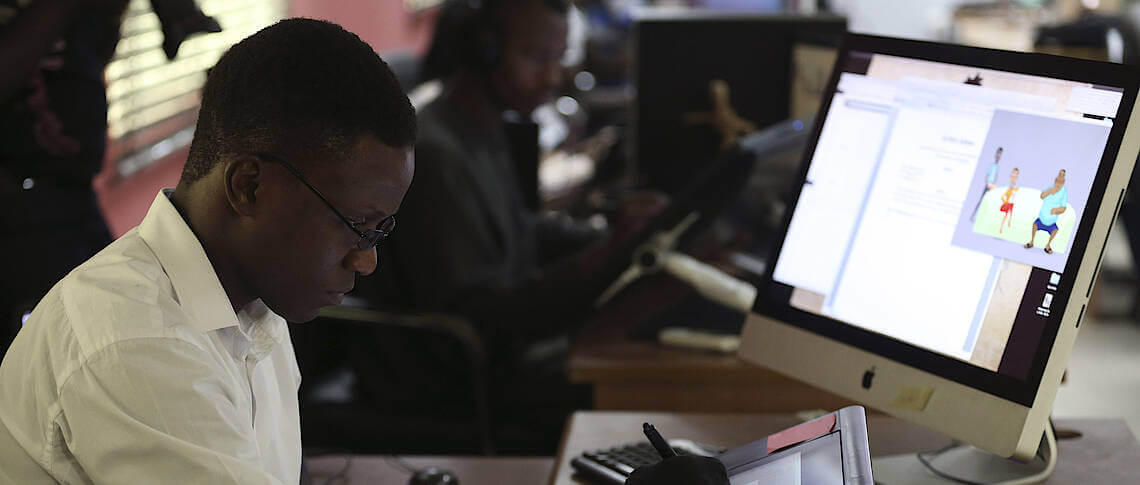How Africa can adapt to the digital revolution

The Fourth Industrial Revolution does not mean the end of traditional manufacturing-based development models in Africa
The Fourth Industrial Revolution is reshaping the world of work. While policymakers in the West are struggling to respond, the task facing African governments appears even more daunting. In navigating the challenges and opportunities of the digital age, the continent’s policymakers must be willing to adapt and experiment.
Most of today’s developed countries, as well as those that transformed their economies in the second half of the twentieth century, relied on export-oriented manufacturing to boost productivity and create large numbers of jobs. But robots, the Internet of Things, and 3D printing may change manufacturing so much in the coming years that African countries aspiring to follow the same path will not get the same bang for their buck, especially in terms of job creation.
Yet, as we argue in a recent report, these and other technologies will also offer African governments new ways to tackle social challenges and boost economic growth. For example, the use of sensors, Big Data, and machine learning could greatly increase the continent’s agricultural productivity. Applying artificial intelligence to personalised learning platforms could transform basic education in many African countries, where results remain poor despite increases in enrolment. And blockchain technology could facilitate transactions that require high levels of trust, such as land purchases.
African policymakers must therefore strike a balance between managing the impact of new technologies in order to benefit as much as possible from traditional manufacturing-based development models and embracing the new opportunities that stem from technological advances. Identifying the right mix of policies for each country will be critical, particularly in view of Africa’s economic, political, and demographic diversity.
Experimenting with the right policy mix
That said, policies that look good on paper may not have the intended effects in practice, as our experience working directly with a number of African governments over many years has shown. After all, attempts to solve complex challenges are inherently uncertain, and policy implementation may be weak.
Given the pace of change in today’s globalised world, and the urgency of the challenge posed by the Fourth Industrial Revolution, African governments need to focus as much on enabling effective policymaking as they do on specific policy measures themselves. Adaptive government will be central to achieving this.
The outside world can play an important role in supporting African governments’ efforts to adapt.
Making government more adaptive requires firms, entrepreneurs, subnational administrative bodies, public officials, and civil society to develop a shared national vision for inclusive growth. This process should gather the best policy ideas, regardless of their origin, and aim to ensure that key economic actors are pulling in the same direction.
African governments should also encourage experimentation. And where policies are reversible (and many are), officials should be biased toward action. Governments should take a portfolio approach to policymaking – similar to what venture capitalists do with their investments – so that successes can balance failures and provide political cover for them. To support such experimentation, governments must develop systems to monitor which policies are working well and which are not, so that successes can be scaled up.
The ability to adapt
Some African countries have already employed elements of an adaptive approach. Liberia’s government, for example, recently experimented with outsourcing school management to a number of different non-state entities and commissioned a study to compare their performance both against one another and relative to regular state-run schools. Meanwhile, the Ethiopian government is developing a ‘portfolio’ of industrial parks as the centrepiece of its plan to make the country an African manufacturing hub. Building the parks in different parts of Ethiopia will allow the government to spread the benefits and potential risks around the country.
To become more adaptive, African governments need to take a top-down approach to setting economic objectives and evaluating efforts to achieve them, while also providing the necessary space for experimentation and learning to allow effective policy ideas to emerge from the bottom. This adaptive approach should be underpinned by a technological focus that keeps the challenges and opportunities of the digital revolution front and centre.
The outside world can play an important role in supporting African governments’ efforts to adapt. For one thing, any attempt to embrace new technologies requires super-fast, reliable, and affordable connectivity – including for those at the bottom of the pyramid. Because African countries cannot shoulder the necessary investment alone, traditional donors and global tech giants alike should explore innovative financing arrangements and experiment with new technologies that can increase access.
More broadly, tech firms and other entrepreneurial organisations can play a key role in bottom-up policy experimentation. At the same time, traditional development institutions should be prepared to offer long-term support to governments that are implementing policies aimed at systemic change.
The Fourth Industrial Revolution does not mean the end of traditional manufacturing-based development models in Africa, but it will require governments and policymakers to become more innovative and experimental. They will have to rely less on detailed planning, and be increasingly prepared to try things, learn, and scale up what works. Africa can find a path to the economy of the future if its governments are ready and willing to adapt.
Source: Kartik Akileswaran, Georgina Hutchinson





